Last week, just in time for the announcement (and release) of a new expansion for Cities: Skylines, I posted a video analysis on YouTube discussing what I perceive as weaknesses in the modular design philosophy behind Skylines' myriad expansion packs. The full video is available on YouTube (and embedded below), but I've also transcribed the text in blog form for those who may prefer reading over watching/listening.
The video is up on YouTube.
I want to start out by saying that I love Cities: Skylines. Skylines is -- without a doubt in my mind -- the single best city-builder since SimCity 4, which released in 2003 (over 15 years ago, as of the time of this recording). When I watched the first trailer for the game, in which the player apparently custom-builds freeway ramps and interchanges from scratch (at about 40 seconds into the trailer), I was sold on this game! After years of having to use boring, pre-fabricated stock on-ramps and interchanges, the little civil engineer withing me practically jizzed in his pants at the idea of being able to build my own highway ramps and interchanges! And there was no looking back.
Cities: Skylines gloriously succeeds where games like SimCity (2013) and Cities XL miserably failed. It picks up the mantle of the great SimCity games of yester-decade, and brings it into the 21st century with deep simulation based on agents, a sleek and modern UI, extensive customizability and moddability, and an attractive 3-D graphics engine. It's made all the more impressive by the fact that the game's developer, Colossal Order, is a small, independent studio that had something like nine people working for it when the game initially launched. And a company with all the manpower and resources of Electronic Arts only managed to produce a flop like SimCity 2013.
... [More]
cdac9d28-8482-4449-a673-ff10d4b7cc87|0|.0
Tags:Cities: Skylines, Cities: Skylines: After Dark, Cities: Skylines: Snowfall, Cities: Skylines: Natural Disasters, Cities: Skylines: Mass Transit, Cities: Skylines: Green Cities, Cities: Skylines: Parklife, Cities: Skylines: Industries, Cities: Skylines: Campus, Colossal Order, city planner, city simulation, strategy, Steam, Paradox Interactive, expansion, YouTube, Sid Meier's Civilization, Civilization V, Civilization V: Brave New World, Civilization VI, Civilization VI: Rise and Fall, Civilization VI: Gathering Storm
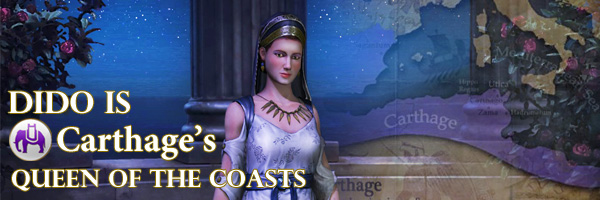
Continuing my series of strategy guides for the civilizations of Brave New World, I have now moved onto legacy civs whose strategies have changed somewhat due to the expansions' features. One civilization that received an indirect upgrade by the changes introduced in Brave New World is Dido's Carthaginian empire. Even though her actual ability didn't change, the new trade route mechanics changed the function of the harbor, which subtly changes how Carthage should be approached by Brave New World players.
In the ancient world, the Phoenicians exercised near absolute dominance over maritime trade in the south Mediterranean. Phoenician control was centered in Tyre, whose colonies paid tribute but were not directly controlled by Tyre itself. When Alexander the Great destroyed Tyre in 332 BC, the Phoenician colony of Carthage began claiming control over Tyre's former colonies in Sicily, Sardinia, Morocco, and Iberia, and established itself as the commercial center of the Western Mediterranean. This economic success and naval supremacy lead to three Sicilian Wars with Greece and three Punic Wars with the Roman Republic. The third Punic War resulted in the sacking and conquest of Carthage by the Romans.
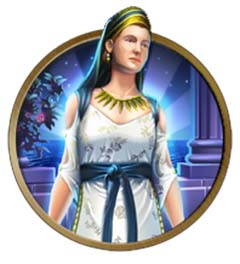
Historical records of Dido are very limited, and historians debate her historicity. The sources available indicate that she was the daughter of an unnamed King of Tyre, who named both her and her child brother, Pygmalion, as heirs. But when the king died, the people refused to acknowledge Dido as heir, and only Pygmalion was recognized. Pygmalion had Dido's husband, Acerbas murdered in order to claim Acerbas' vast wealth, and Dido stole away Acerbas' gold and fled Tyre along with some attendants and senators. She landed in North Africa, where a local Berber king granted her an amount of land that she could encompass with a single oxhide. So Dido cut the oxhide into small strips and encircled an entire nearby hill upon which the city of Byrsa was founded. She would later also found the city of Carthage before sacrificing herself in a pyre in order to remain faithful to her deceased husband and escape a marriage proposal from the Berber King. She would later be deified by the Carthaginian people, making it difficult to determine if the stories are genuine or just legend. [More]
74f48afc-17c0-43fc-a94b-e6ee198c32ae|6|4.0
Tags:Sid Meier's Civilization, Civilization V: Gods & Kings, Civilization V: Brave New World, Civilization V, Carthage, Dido, Phoenician Heritage, Quinquereme, African Forest Elephant, trireme, horseman, Feared Elephant, mountains, harbor, cargo ship, trade route, navy, Great General, Civ-V
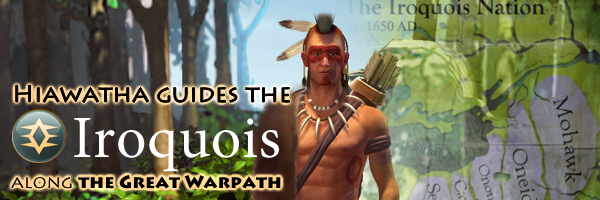
There's one civilization that I have not yet covered in my Brave New World strategies series that did receive an explicit rewrite of its unique national ability. I haven't covered them yet because that rewrite isn't so much a change to their ability, as it is really just a clarification that the ability applies to the new rules. The Iroquois civilization led by Chief Hiawatha has an ability that explicitly utilizes the expansion's trade route mechanics. The Iroquois are another civilization (like India) that receives a lot of hate from the Civ V gaming community due to some supposedly lackluster, highly-situational uniques. This strategy will focus on utilizing those uniques when they are beneficial, and on compensating for their downfalls and limitations.
Very little is known about the early history of Iroquoian people prior to the arrival of Europeans in the Americas. The Native American tribes had no written language, and their histories were passed down through oral tradition. According to that tradition, a great Peacemaker united the eastern Great Lakes tribes of the Mohawk, Oneida, Onandaga, Cayauga, and Seneca sometime between the 12th and 15th centuries. Other tribes would later join the confederacy, including some that were displaced from their native lands by European settlers. Iroquois culture was matrilineal, meaning that children were born into the mother's family, and women had a great deal of influence in the politics of the tribes. The Iroquois Confederacy utilized a representative system in which each tribe appointed a number of chiefs (based on relative population of the respective tribes) to serve on a council. There was both a council of male chiefs, and also a council of clan mothers that both had roughly equal authority.
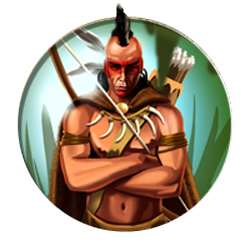
Hiawatha is a near-mythical figure in Iroquois history. He was a follower of the Great Peacemaker, who traveled between the various tribes of the region preaching a prophecy of a strong alliance uniting all the tribes of the Great Lakes region in peace. Hiawatha, along with the Peacemaker, effectively founded the Iroquois Confederacy using his skills as an orator (and, in some traditions, magic) to convince the various tribes to join. According to oral tradition, the Seneca resisted the alliance, leading to a confrontation that was stopped when the sun miraculously went dark, turning day into night. This supposed solar eclipse lead the Seneca to put down their arms and commit themselves to the alliance. [More]
070ae582-fddf-40f1-8379-9204a2c72f78|1|5.0
Tags:Sid Meier's Civilization, Civilization V: Brave New World, Civilization V: Gods & Kings, Civilization V, Iroquois, Hiawatha, Mohawk Warrior, Longhouse, Great Warpath, forest, jungle, food, deer, city connection, production, workshop, swordsman, Mohawk, Oneida, Onandaga, Cayauga, Seneca, Civ-V
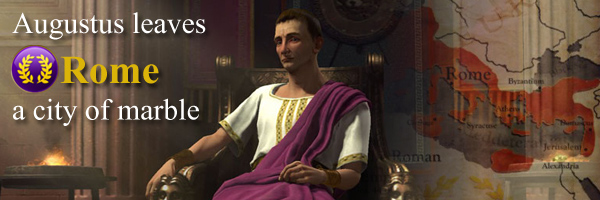
I've already covered strategies for the civilizations that have been added or explicitly changed in the Brave New World expansion and its major fall (2013) patch. Now I'm going to move on to other legacy civilizations that have not had explicit changes, but who may have had their strategies significantly altered by the expansions and other updates. This time, I will be covering one civ that surprisingly does not benefit from Brave New World's new mechanics as much as one might think: the Roman Empire.
Rome is one of the most influential and heavily romanticized cultures of the classical world. The early Roman republic was a system of semi-democratic representational government. Power was divided between two consuls who were annually elected by the citizens and alternated as military leaders to check each others' ambitions, while an appointed body of senators directed foreign policy and enacted laws. The city gradually expanded its power and influence in the second half of the first millennium BC through the overwhelming success of its legionary forces and defeat of its primary rival Carthage, until it eventually came to control almost the entire Mediterranean. Rome itself became the center of government and commerce for most of Europe, and it established an elaborate network of roads, aqueducts, and other engineering feats.
The Roman government was generally very tolerant of foreign religions and cultures, which helped to pacify subjugated peoples. But as Rome became an empire, and its holdings expanded, this tolerance became a liability. Foreign peoples were allowed admittance into the army in order to secure Rome's ever-increasing borders, which lead to a decline in loyalty to Rome as the army became more diverse and less centralized. Eventually, generals would begin competing with each other for control of Rome and the title of emperor, weakening the empire from within and making it vulnerable to external threats such as immigrating Germanic tribes displaced by the Huns. Eventually, these threats would culminate in the sacking of Rome by the Visigothic leader Alaric in August of 410 AD, and the collapse of the Western Roman Empire. However, the eastern half of the empire, also known as the Byzantine Empire, would continue to carry the torch of Rome for another thousand years.
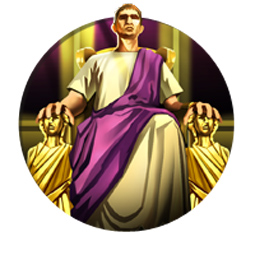
After the death of Julius Caesar, his adopted nephew and heir, Gaius Octavius, along with Marc Antony and Marcus Lepidus, tracked down and defeated Brutus, Cassius, and the other assassins who had conspired against Caesar. This new triumvirate quickly disintigrated into civil war, with Octavius decisively defeating both Lepidus and then Antony and holding sole authority over a new Roman Empire. He changed his name to Caesar in honor of his adopted uncle, and reinstated the Roman senate as a puppet facade government to legitimize his dictatorial leadership. He was extremely popular among the Roman citizens due to his relation to Julius, and was eventually honored with the title Augustus. He instituted numerous domestic reform including official police and fire-fighting services, engineering projects such as roads, and expanded the dominion of Rome in Africa, Hispania, and Germania. Octavius found Rome a city of bricks; Augustus left it a city of marble, and the envy of the western world. [More]
d459e477-29a8-4c05-a582-9bfa0d6c216a|2|5.0
Tags:Sid Meier's Civilization, Civilization V: Brave New World, Civilization V, Rome, Augustus Caesar, Legion, Ballista, Glory of Rome, production, trade route, capital, swordsman, catapult, Civ-V
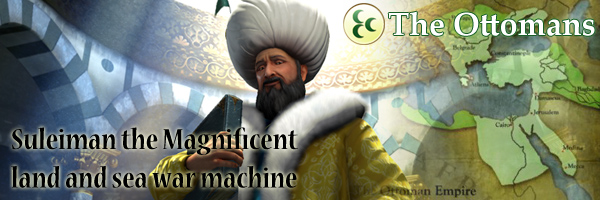
I've already covered strategies for the civilizations that have been added or explicitly changed in the Brave New World expansion and its major fall (2013) patch. Now I'm going to move on to other legacy civilizations that have not had explicit changes, but who may have had their strategies significantly altered by the expansions and other updates. The first such civilization that I am going to tackle is one that has been requested from readers on at least several occasions. So, by popular request, here is a strategy for Sultan Suleiman's Ottoman Empire.
The rise of the Ottoman empire coincided with the fall of the Byzantine empire that started in the late thirteenth century. Turkish immigrants lead by Osman I took control of a region of Anatolia and Osman declared himself the first Sultan of a new Islamic empire. The fledgling empire quickly began a cycle of conflicts with the Byzantine empire that culminated in the capture of Constantinople, which the Ottomans renamed Istanbul and made their imperial capital. With control of the valuable ports of Istanbul that linked the Mediterranean with the Black Sea, the Ottoman empire rapidly became a dominant force in the Middle East and Europe.
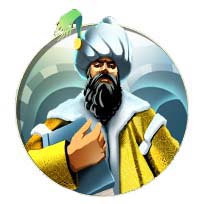
Sultan Suleiman The Magnificent ruled the Ottoman empire during the height of its power in the sixteenth century. His fleets dominated the seas of the Mediterranean - and extended its influence all the way to India and Indonesia - thanks in part to the successes of Hayreddin Barbarossa, who captured numerous ships on his way to becoming the Ottoman fleet admiral. In addition to military successes, Suleiman also personally initiated a series of sweeping social and legal reforms that contributed to the flourishing of the Ottoman arts and economy.
The Ottoman Empire would eventually become one of the most significant casualties of World War I. The empire was already starting to succumb to the stresses of internal strife and a weakening economy. Their defeat in World War I basically dissolved the Ottoman empire, and what was left of its holdings became the modern nation of Turkey. [More]
e1b70122-9c10-4a58-b569-98239be273c5|5|3.6
Tags:Sid Meier's Civilization, Civilization V: Brave New World, Civilization V, Ottoman, Suleiman, Istanbul, Janissary, Sipahi, Barbary Corsairs, barbados, navy, exploration, reconnaissance, musketman, lancer, Landsknecht, Prize Ships, unit cap, unit maintenance, Civ V Fall Patch, Civ-V
|

| 12 | | | | | | | 60 | | 11 | | | | | | | 55 | | 10 | | | | | | | 50 | | 09 | | | | | | | 45 | | 08 | | | | | | | 40 | | 07 | | | | | | | 35 | | 06 | | | | | | | 30 | | 05 | | | | | | | 25 | | 04 | | | | | | | 20 | | 03 | | | | | | | 15 | | 02 | | | | | | | 10 | | 01 | | | | | | | 05 |
|